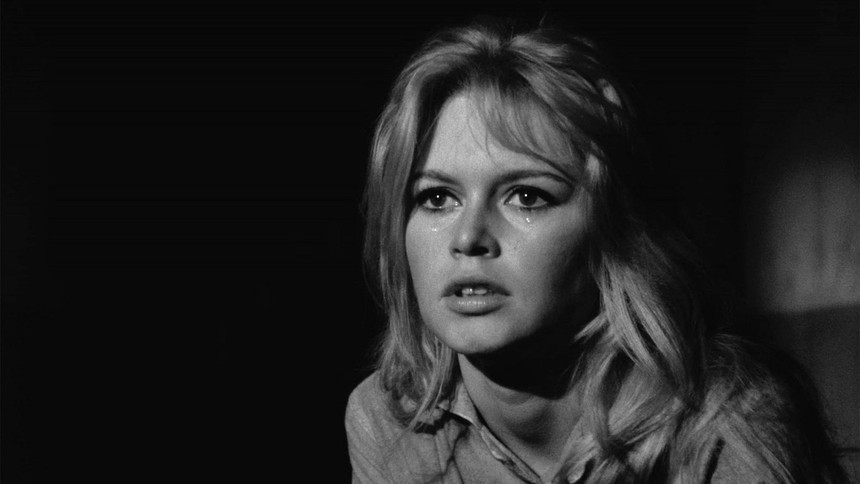Blu-ray Review: In LA VERITÉ, Brigitte Bardot and Henri-Georges Clouzot Take Aim At Institutional Misogyny

A prisoner enters a courtroom, charged with the murder of her boyfriend. She and her attorneys will argue that the death was not premeditated, but rather occured in a moment of personal anguish -- and that the intended victim was, in fact, herself.
The prosecution will argue, instead, that she was... well, for all intents and purposes, a very naughty girl, sexually adventurous and bohemian, refusing to play by whatever rules exist for proper women in 1950s France. As a result of her flagrant disregard for social convention and proper behaviour, every conceivable book that can be thrown at her, should.
Henri-Georges Clouzot claimed that his 1960 film, La Verité, was created with the intent of exploring how it is impossible to judge a person, once full knowledge of that person's story was in place. Viewed in 2019, where it has recently joined the Criterion Collection on Blu-ray at spine #960, constrains the focus even more. This is a masterful exploration of how many systems of suppression exist to ensure that women are never free, made by a filmmaker whose own commitment to that idea may have been, at the least, questionable.
Brigitte Bardot tears a hole in the screen in La Verité, giving a heartbreakingly nuanced performance as a woman caught in a world she just can't make work while remaining within the bounds of being true to herself. It's a tried-and-true framework for a story, but Bardot gives Dominique both breadth and depth beyond the normal trappings of an aimless free spirit. Told largely in flashback from the story's endpoint -- Dominique's trial for murder -- the effectiveness of the movie pivots on whether we, as an audience, can empathize with Dominique, even while some of her behaviour remains patently thoughtless and self-absorbed.
It isn't the thoughtlessness and self-absorption that the film calls into question; it's whether there's space, at all, for her to be happy within boundaries (marriage; career; mental health) that her prim and avaricious sister has mastered far more quickly than she has. Bardot, herself betrayed by her million-watt screen charisma and status in world cinema as a sex symbol, knows that there is real meat in the idea of a woman wanting to be more than an object.
She becomes obsessed with her lover (and eventual murder victim), played by Sami Frey; but there is real emotion in that obsession, which is more than we can say for him, whose sexual fascination for Dominique compels him to keep her in his life only as far as the bedroom door. Michel is a self-righteous and self-obsessed musician, alive with the fire of his art, and utterly at a loss to grapple with the real freedom Dominique represents. He responds as men like him always do: negging, control, violence, and (at least once) attempted rape.
There's some offscreen irony in this, as the Blu-ray special features at least partially make clear. Clouzot is creepy, an urbane but mean-spirited provocateur who, were he alive today, might be (best case) a Lars Von Trier type, and (worst case) something else. He worked for the Nazis during the occupation of France, and one gets the sense that he, like any number of directors, would happily work for Satan, too, if it meant getting final cut for films that he considered to be of social importance far exceeding their human cost. He was notorious for assaulting his actors to arrive at performance for example, a tidbit which is made all the more relevant for La Verité's example by the fact that, as the story goes, when he slapped Brigitte Bardot to prepare her for a scene, she slapped him right back. William Friedkin not only swiped the scenario for Wages of Fear from Clouzot (to make Sorcerer); he took the "directors who slap actors" thing, too. There's a particular strain of director-as-manipulative-brat that Clouzot exemplifies.
All of this comes through in a one-hour documentary that accompanies La Verité on the Blu-ray, titled "The Clouzot Scandal." It was made a few years ago for French television and has an unmistakably "Behind the Music" vibe to it, but offers a wealth of archive material with Clouzot himself and spends a great amount of time on Clouzot's Nazi collaborations and on La Verité itself.
Extras on the disc are otherwise light, being restricted to an extremely short TV interview with Clouzot (4 minutes), and a slightly longer retrospective interview with Bardot (18 minutes, filmed in 1982). The film itself is the major draw here, and it looks predictably perfect, the fine detail in Armand Thirard's black and white photography popping brightly off the screen. It's a fun, beguiling watch, with unsettlingly contemporary things to say about life in the world of men.







